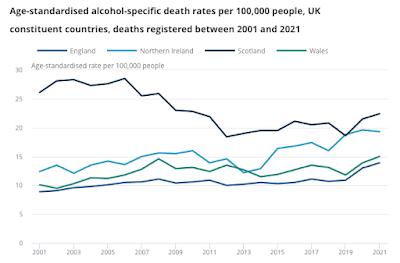Over the past 15 years, its devolved government has attempted to reduce alcohol-related harm through a ban on multi-buy price promotions on alcohol, minimum unit pricing, reducing the drink-driving limit and restricting alcohol marketing on TV. And partly due to these efforts, alcohol harm fell in Scotland between 2003 and 2012, before plateauing. The emphasis in Scotland continues to be on high-risk groups.
She is right to say there was a fall in alcohol harm, as measured by alcohol-related deaths, between 2003 and 2012, although the rate is still far higher than in England.
So which policies does she think achieved this? As you can see, she names four.
1. Ban on multi-buy discounts.
Introduced in October 2011. When it was evaluated in 2014 it was found to have had no effect on alcohol consumption.
2. Minimum pricing.
Introduced in May 2018, long after the decline in mortality. Regular readers will be aware that this policy died on its arse. All the evidence to date suggests it reduced alcohol consumption slightly but not among heavy drinkers who are consuming more. There is no evidence of health benefits and some suggestion of harm.
3. Reducing the drink drive limit. Introduced in 2014, after the fall in alcohol-related deaths. It has been evaluated twice. Both studies concluded that it had no effect.
Firstly, this study in 2018 found that lowering the limit "was not associated with a reduction in RTAs [road traffic accidents]" but it did damage the pub trade.
Secondly, this study in 2021 found that lowering the limit "had no effect on drink driving and road collisions".
4. Restricting alcohol marketing on TV.
This hasn't happened and the Scottish government doesn't have the power to make it happen. It is a figment of her imagination.
So, we have four policy changes, one of which is imaginary. The three that are real didn't work and two of them took place after the period in question. Top work from a public health PhD!
Devi doesn't ask why heavy drinking went up so much in 2020 and 2021 despite overall drinking going down, but if she gave it some thought she might find some useful lessons for how to reduce alcohol-related deaths in the future.



No comments:
Post a Comment